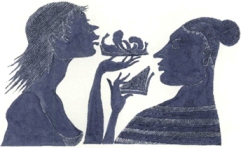The Danes themselves will be among the first to say of their speech, det er in get sprak, det er en halsinfektion — "it's no language, it's a throat infection!"
Nordic languages are quite similar and often speakers of one can generally understand speakers of another. However, there are real risks of occasional misunderstandings because there are a good few words which look the same but have different meanings in the different languages. A Dane may run into trouble when speaking about rolig to a Swede. Meaning "calm," "tranquil," and "restful" in Danish, this identical word means "funny," "amusing," and "entertaining" in Swedish. So when you're told that a certain restaurant is rolig, it's good to be entirely sure which language you are hearing!
janteloven [yan-teh-loh-wen] (noun)
This exists outside Denmark but is rarely described so succinctly. It is sometimes translated as "the tall poppy syndrome" — you may put yourself on a pedestal but be prepared to get knocked off. It is the Law of Jante, as elaborated in a novel by Aksel Sandemose. So you may be good, but you're no better than the rest of us. We're all equal and all equally good. Who the hell do you think you are?!
smorrebrod [smerr-er-brerd] (noun)
The world-famous Danish open sandwich. But isn't an open sandwich just a closed one that has been ceremonially prized open like a reluctant clam or a mummy's tomb? No indeed, for to cover the top of an open sandwich would be to abuse the filling, or rather the topping. It would deface the trimmings and humiliate the emancipated pink prawns that grace it, lying there in all their naked glory, parading themselves and basking amid a shallow sea of fresh watercress, luring potential diners to sample their wares. We should beware of contaminating this concept by association with the common and rather plain sandwich of middle-class picnics.

festlig [fest-lee] (adjective)
Festlig is an adjective formed from the noun fest, meaning "party" and any public festivities in general. The adjective, however, is far more versatile, and is used about things as diverse as wallpaper, table decorations, clothing, an evening with friends, people who are the life and soul of the party, and of course, the ubiquitous Danish parties themselves. It can also refer to someone who's a live wire, a good laugh, full of party spirit, and generally has a festive outlook on everything.
folkelig [fol-keh-lee] (noun)
Folk means "people" in general but "a people" specifically. What offolkelig? Belonging, related, and pertaining to the people? Popular? Let's look at some examples. Folkelig idrcet is popular sport, not of international standing but firmly rooted in ordinary people pounding the pavement in sweatpants. Folkelig oplysning is everything from public information to popular enlightenment. Harking back to the common Nordic trait folkelighed, folkelig is indicative of a culture where elitism is unacceptable and popular culture has always had an eminent position.